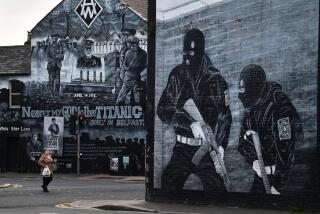New IRA ‘Spectaculars’ Seen Stalling Peace : Europe: The Heathrow attacks are viewed as just the beginning of the republican campaign.
- Share via
LONDON — The first four mortar rounds whistled onto runways at Heathrow Airport, one of the world’s busiest, 10 days ago, leaving their launching pad--a stolen car--blazing in a hotel parking lot.
Two days later, four more rounds landed on Heathrow, fired from a wooded area near the airport. Then, on Sunday morning, four more, this time fired from a scrub area, landed on the airport, one of them on the top of a terminal building.
None of the rounds detonated, though each was stuffed with explosives.
But these “spectaculars,” as the Irish Republican Army is calling them, along with almost a dozen disruptions of trains and airport service during the week have left little doubt about the IRA’s stand on the latest peace initiatives.
Experts on Northern Ireland predict that the attacks on Heathrow, where about 130,000 travelers arrive and depart on 1,000 flights a day, are just the beginning of a renewed mainland campaign by the IRA, which is seeking to force the British government to make more concessions. And the hopes for peace, raised just a few months ago, are in tatters.
“There is a double stalemate at present,” said Brendan O’Leary, a political scientist and expert on Northern Ireland at the London School of Economics. “It is very clear the IRA and Sinn Fein are not going to accept the Downing Street Declaration. And the Anglo-Irish peace initiative has been virtually suspended.”
The Downing Street Declaration offered Sinn Fein, the outlawed IRA’s legal political wing, a role in talks on the province within three months of the guerrillas’ renouncing violence.
The IRA is fighting to end British rule in Northern Ireland and have the province absorbed into the Irish Republic.
In that declaration, Britain said it had no long-term interest in Northern Ireland, a key demand of the IRA. But Britain, balancing its long allegiance to the province’s Protestant majority, also vowed to respect the electoral wishes of the people of Northern Ireland.
Now Gerry Adams, leader of Sinn Fein, suggests that the British have not gone far enough.
Although Adams insisted Thursday in a St. Patrick’s Day message that peace is still possible, he and his colleagues believe that past attacks on the British mainland, such as the 1991 mortar attack on the prime minister’s offices on Downing Street, were key factors in forcing the government to raise the possibility of negotiating with Sinn Fein.
And they are unwilling to give up their armed campaign, figuring that more pressure on Prime Minister John Major’s government will mean more concessions.
“The causes of the conflict are ongoing,” Adams told a radio station after the first set of mortar shells were fired at Heathrow. “And every so often there will be something spectacular to remind the world.”
The British government refuses to be seen to be knuckling under the terrorist threats.
In an anecdote widely reported in Britain, and indicative of that resolve, Queen Elizabeth ordered her pilot to “carry on” and land at Heathrow last week after she was told that there had been coded, telephoned threats of a mortar attack on the airport. Three hours later, an IRA mortar round crashed yards from where her flight had touched down.
With both sides taking entrenched positions, analysts expect the coming weeks and months to bring more IRA “spectaculars” and even greater deterioration in the peace hopes.
“As long as this stalemate persists, the IRA is likely to step up its campaign here,” said O’Leary, the political scientist. “And the most likely scenario is that the current antagonism will persist, with no end in sight.”
A big question in Britain is whether the IRA ever intended for the mortars to explode.
Scotland Yard said the bombs all had an identical mechanical malfunction. It insisted that they were designed to “maim and destroy,” and, in fact, the IRA has occasionally in the past used armaments that, because of age, had failed to detonate.
One London newspaper, quoting unnamed sources, said the IRA was double-crossed by one of its operatives, who had disarmed the bombs without permission before they were fired.
But others suggest that the IRA knows that it would be politically disastrous to bomb a jetliner, killing untold numbers, many of them likely to be foreigners.
“It’s more important for the IRA to show they can do this,” one expert said. “It enhances their threats, raises the security costs and the feeling of general uncertainty. From their point of view, that’s the kind of trouble they want to cause for the British government.”
More to Read
Sign up for Essential California
The most important California stories and recommendations in your inbox every morning.
You may occasionally receive promotional content from the Los Angeles Times.














